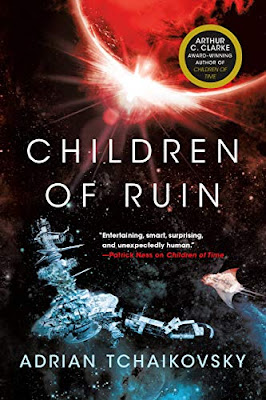I loved Tchaikovsky's Children of Time, which is some of the most interesting science fiction I've read in recent years. I found this sequel, Children of Ruin, a bit harder to follow, but it's mainly because there's just so much going on it was easy for me to forget who's who and what was happening (maybe this one is written too much in octopus mode for my mere human intellect!). Still, I loved this book. I only rate it slightly lower in comparison to the first.
We start with another voyage from Earth, and this time the humans bring octopuses (or octopi if you prefer). Lo and behold, another catastrophe occurs for our humans, leaving the octopuses to inherit a planet. But this time the catastrophe has to do with a genuinely extraterrestrial life form, one that generates some genuinely horrific moments.
Fast forward many hundreds or maybe thousands of years, and we meet the descendants of the humans (or posthumans called "Humans") and the Portiid spiders from the first one! Having received a signal from a nearby solar system, they've come to investigate, where they meet the octopuses, extraterrestrials, and maybe someone sort of human in a somewhat similar way that "Andrea Kern" still exists (it's complicated).
It's hard enough for the spiders and Humans to communicate, but the octopuses are a whole other matter, not to mention the extraterrestrials (maybe like a slime mold?). It's bold, science fictional fun!
Like I said, my only real complaint is that it can be hard to follow. Some of this may be intentional, because spider, octopus, and ET intelligence is fundamentally different from ours. Tchaikovsky's talent in inhabiting those minds without making them too human is breathtaking. But it's not always easy reading: it stretches your mind, which is all part of the fun.
We humans tend to assume that our minds are synonymous with "intelligence" in general. But the animal kingdom here on Earth has been trying to show us otherwise as many of our fellow creatures have intelligence, but not as we know it. And how even more alien would extraterrestrial intelligence be? I doubt we'd be having easy conversations like they do on Star Trek.
What can these reflections tell us about our own minds or the concept of minds in general? What is it to have a mind, if minds can differ so greatly? I'm reminded of a quip from the Austrian philosopher Ludwig Wittgenstein: "If a lion could talk, could we understand him?"
Or consider the philosophical traditions of South Asia, most of which have always considered animals to be not so radically different in kind from humans given the background of karma and rebirth. The Buddhist philosopher Vasubandhu, for example, considers rebirth as an animal as another kind of experience. Whenever I think about animals, I wonder, "Who the hell do we humans think we are, anyway?"
Personal identity is another big topic in the novel. We've already met the causal descendant of Andrea Kern in the first novel. She shows up here, too. Or does she? Is this really Kern anymore? Or something different? Our friendly Buddhists might say that ultimately there never was a Kern, but maybe we could say there's enough causal continuity to call this new being "Kern" as well, at least conventionally.
The situation gets even more complicated with regard to the fate of some of the humans here. They're not just continuing via unusual means, they're merging their personalities with... okay, maybe I won't say to avoid too many philosophical spoilers, but the philosophical issue of personal fusion comes up. Well, sort of. With a delightfully bizarre science fictional twist.
Okay, maybe I'm talking myself into rating this more in line with the first one. In any case, I eagerly await the third book in the series to see what sorts of minds we might meet next.

No comments:
Post a Comment